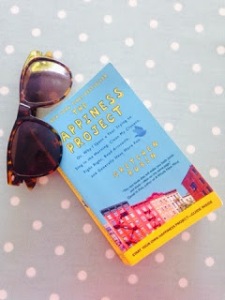I have never been remotely interested in self-help books, simply because I never believed I needed the help they had to offer; how wrong I was.
This book instantly caught my eye in a small book store at Suvarnabhumi airport in Bangkok. I was awaiting a long flight home after having spent the last three weeks in paradise, and its bright and cheerful cover instantly attracted my attention. The title and its vibrancy subconsciously convinced me that this was the book I needed to cheer me up and prepare me for my descent back to rainy England. I bought it in a hurry, without even reading the blurb (something completely unheard of for me!) and I didn’t even realise it was part of the self-help genre until I opened it on the plane. However, once I’d started reading, not even the insufferable turbulence could tear my attention away from its pages.
‘The Happiness Project’ tells the biographical story of Rubin’s year-long journey, where she aims to discover the true meaning of happiness for her and how to achieve it. In her introductory chapter we see her setting herself several resolutions and challenges for every month of the year, with this sequential chronology used for the structure of the book. Each chapter focuses around an individual goal that is crucial to achieving happiness such as ‘Aim[ing] Higher’ or ‘Lighten[ing] Up’ and accounts her efforts, the struggles she faces and the results she sees within each particular month.
She admits in her introductory chapter of the book that her project did not originate from necessarily unhappy feelings but actually derived from a fear of wasting her life and an undesired lack of gratitude for the life she was living. She wanted to change her life without changing her life, and saw the importance of preparing oneself for what she called the ‘phone call’; the inevitable forbearer of bad news. She merges and modernizes past theologies of happiness and introduces it as a spectrum; something that can be boosted to its full potential if the necessary steps are made. By recreating happiness as a universally achievable goal that can be obtained through such small manageable steps she draws in a wider target audience, with her belief that a Happiness Project will benefit everyone and anyone; young or old, happy or sad.
Rubin’s witty yet self-concious style of writing draws attention to potential criticism’s of the book and indeed of herself as an individual. She recognises her imperfections and shows awareness of the limitations of her Happiness Project, admitting how it may be a much harder project to carry out for those facing chronic depression and mental health problems. She expects and awaits criticism’s of egocentricity, but it is her self conciousness that makes the book so refreshing and engaging, making her an author whom many readers will find it easy to relate to.
Rubin counteracts such critiques of narcissism through her active encouragement for readers to start their own ‘Happiness Project’s, and she uses her blog and website to assist and inspire others in creating their own individual projects and resolutions. This is what I find uniquely remarkable about Rubin’s book. It has shown incredible growth since its publication and has helped build both online and offline communities — a very important factor in boosting book sales — and happiness! Her website exists as a medium for people to interact with each other and share their experiences and progress with their own Happiness Projects. In this way Rubin has created a way of reaching and engaging with her readers, and has given her readers a means of spreading ‘word of mouth’ sales; sales that are propelled through hearsay and recommendations.
Overall, I found ‘The Happiness Project’ a burst of fresh optimism from start to finish; an original blend of laugh-out-loud moments and touching sentiments. Packed with motivational quotes and lessons, it has the rare ability of bringing cheer from the very first page and will be a place to turn for many on rainy days. Having successfully blurred the lines between the self-help, biography and fiction genres, it’s a book in which those who are uninterested in seeking guidance from the self-help genre can still find pleasure and reassurance in reading.
I just wrote a review about the same book a couple of days ago!! I have the same opinion when it comes to self-help books and I was SOO reluctant to buy it, but I ABSOLUTELY loved it so much that I decided to make my own happiness project! My favorite thing about the book is its style. It’s not authoritative or bossy. It doesn’t have the “I have my shit together, unlike you, you sad sad loser” vibe, so basically you don’t feel like an idiot with serious life issues. Another favorite thing is that she didn’t go on a fancy soul-searching journey either! She just did it while keeping her usual lifestyle! 🙂
LikeLiked by 1 person
Totally agree! I have a very difficult time getting through self-help books. They are often so preachy and patronizing. This one was wonderful because Gretchen is so honest, she isn’t perfect, and everything is so applicable to our own lives. Even though the author is quite wealthy, it was very down to earth and totally do-able for the average person. Loved your review…and not just because I agreed with you! 🙂
LikeLiked by 1 person
Thank you!! I’m so glad you liked it 🙂 !
LikeLike